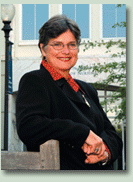













|
 |
 |
 |
 |
| |
  t
is the best of times and the worst of times for nursing. Today’s
health care challenges provide unprecedented opportunities for doing
good by improving how we practice, yet we find ourselves in the
midst of the worst nursing shortage ever. Fortunately, as the Nell
Hodgson Woodruff School of Nursing embarks on its second century,
we are well positioned to address this crisis and improve care at
home and abroad. t
is the best of times and the worst of times for nursing. Today’s
health care challenges provide unprecedented opportunities for doing
good by improving how we practice, yet we find ourselves in the
midst of the worst nursing shortage ever. Fortunately, as the Nell
Hodgson Woodruff School of Nursing embarks on its second century,
we are well positioned to address this crisis and improve care at
home and abroad.
Nurses play a pivotal role in this
regard. We truly are the interface between patient care and the
experience of each person touched by the health system. We can lead
in making the experience better for everyone and address some of
our most pressing issues: Care for the growing numbers of elderly.
Coordination of services for the chronically ill. And provision
of culturally appropriate primary care and health promotion services
to all people. When nurses work to address these challenges, more
people receive the care they need at significantly lower cost.
The School of Nursing confronts these
issues daily as an integral part of the Woodruff Health Sciences
Center and the university. Our role in this interdisciplinary movement
to improve the science and practice of health care has helped to
create a context in which the possibilities for nursing’s
future are limitless.
The results are evident, as you will
see in this issue of Emory Nursing. Our school is leading
the way in preparing students in the burgeoning field of genetics,
a program that has been interdisciplinary in nature since its start
here nearly 30 years ago. And much of the Centers for Disease Control
and Prevention’s leading work to advance public health practice
is done through its Epidemic Intelligence Service (EIS), a highly
trained corps of scientists. Eight of our graduates have successfully
competed to become EIS officers. These nurses are improving health
in very big ways and exemplify the type of leaders we are committed
to preparing.
At the School of Nursing, we measure
ourselves daily by how relevant we are to what is happening in the
world around us. What really matters is that we live out our potential
to improve nursing’s ability to care. Thanks to all who help
make “doing good” our legacy.

Marla E. Salmon, ScD, RN, FAAN
|
|
|
|